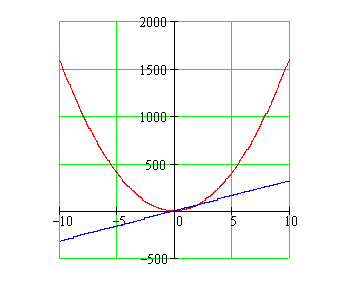
Resources
Math 3 Course Home Page
Math 3 Course Syllabus
Practice Exams
Textbook Home Page
Post a Comment
Contents
In this lecture we take our first look at what it means to solve an equation involving derivatives. We also consider what we mean by the velocity and the acceleration of a moving object.
Quick Question
Which is the graph of the velocity, and which the distance, for an object falling from rest near the surface of the earth?
Outline
Outlines forAntiderivatives and Initial Value Problems
Velocity and Acceleration
Textbook
Antiderivatives and Initial Value ProblemsVelocity and Acceleration
Today's Homework
Log into WebWorKQuiz
Antiderivatives and Initial Values Problems QuizVelocity and Acceleration Quiz
Examples
-
 Graph sin2(x), then use the graph to sketch an antiderivative of sin2(x).
Graph sin2(x), then use the graph to sketch an antiderivative of sin2(x).
-
 Let g'''(x) = sin(x), with the conditions g(0) = 0, g'(0) = 1, g''(0) = −1. Find g(x).
Let g'''(x) = sin(x), with the conditions g(0) = 0, g'(0) = 1, g''(0) = −1. Find g(x).
-
 Find a solution to a 4th-order differential equation.
Find a solution to a 4th-order differential equation.
-
 A golfer on the moon (where gravitational acceleration equals 1.67 m/sec2) hits a ball whose initial velocity in the vertical direction is 30 meters per second. What is the maximum height the ball reaches?
A golfer on the moon (where gravitational acceleration equals 1.67 m/sec2) hits a ball whose initial velocity in the vertical direction is 30 meters per second. What is the maximum height the ball reaches?
-
 A meteoroid falling to Earth is discovered when it is at an altitude of 9000 kilometers, traveling at a velocity of 70 kilometers per second. Assuming acceleration due to Earth's gravity is constant, and neglecting air resistance, how fast will the meteoroid be falling when it hits the ground? What will its acceleration be?
A meteoroid falling to Earth is discovered when it is at an altitude of 9000 kilometers, traveling at a velocity of 70 kilometers per second. Assuming acceleration due to Earth's gravity is constant, and neglecting air resistance, how fast will the meteoroid be falling when it hits the ground? What will its acceleration be?
-
 You drop a rock off Quechee Gorge Bridge and it hits the water below about 3.2 seconds later. Approximately how high is the bridge?
You drop a rock off Quechee Gorge Bridge and it hits the water below about 3.2 seconds later. Approximately how high is the bridge?
Videos
 If f(x) is an antiderivative of f'(x), so is f(x) + constant
If f(x) is an antiderivative of f'(x), so is f(x) + constant
 y'(x) = cos(3x), y(0) = 5
y'(x) = cos(3x), y(0) = 5
 y'(x) = x12 + 1, y(1) = 15/13
y'(x) = x12 + 1, y(1) = 15/13
 Ball is thrown upward 10 m/s initial velocity; how high does it go?
Ball is thrown upward 10 m/s initial velocity; how high does it go?
 Deriving s(t) = 16t2 + v0t + s0
Deriving s(t) = 16t2 + v0t + s0
 How long does it take Wile E. Coyote to fall off a 100-ft cliff?
How long does it take Wile E. Coyote to fall off a 100-ft cliff?
 If Wile E. Coyote takes 20 seconds to reach the ground, how high is the cliff?
If Wile E. Coyote takes 20 seconds to reach the ground, how high is the cliff?
 If initial velocity is 3 ft/s upward, and he hits the ground with velocity 100 ft/s, how high is the cliff?
If initial velocity is 3 ft/s upward, and he hits the ground with velocity 100 ft/s, how high is the cliff?
